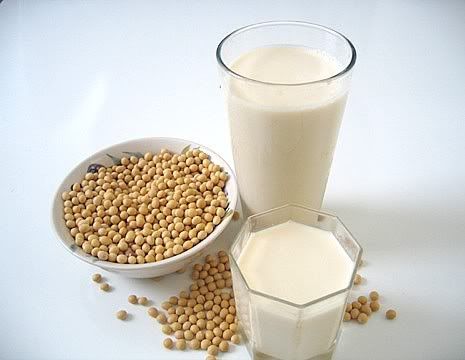Soy, Not a Health Panacea But A Health Risk
Here we go again.
Yet more evidence of widespread dis-information.
How many ads have you seen telling you of the benefits of soy products?
How many bogus studies have claimed the same?
How many lives have been claimed or damaged by these lies?
Scientists at the FDA's own Center for Toxicological Research have warned of soy protein's carcinogenic potential and of the health dangers of excess soy-food consumption.
As if this was not enough soy products also over dose us with Fluoride...
Some of these "health foods" which have high levels of fluoride are found in soy protein isolate, a key ingredient in energy bars, shake powders, veggie burgers and infant formula.
Babies on soy formula are at special risk not only for developing dental fluorosis but the mental fluorosis of ADD/ADHD. Although the fluoride levels of both soy and dairy formulas exceed that of breast milk, only soy formulas exceed safe levels when reconstituted with non-fluoridated distilled water. The levels increase considerably when parents reconstitute soy formula with fluoridated tap water. Worse, these soy bottle-fed infants are simultaneously exposed to high levels of neurotoxic aluminum, cadmium, manganese and plant estrogens. It's bad enough to expose adults to fluoride with its well established links to cancer, thyroid and other endocrine system disorders but unconscionable to expose infants and children whose brain, reproductive and other systems are developing.
Recently the U.S. Agency for Healthcare Research and Quality reported that most of the research carried out on soy to date is “inconclusive.” The scientific literature review, carried out by a team of researchers at Tufts University in Boston, concluded that soy products appear to exert “a small benefit on LDL, cholesterol and triglycerides, but the effects may be of small clinical effect in individuals.”
But the researchers couldn't even determine from the studies how much soy protein might be needed for lipid reduction! The studies alleging that soy might reduce menopausal symptoms were judged to be either of “poor quality” or “their duration was too short to lead to definite conclusions.”
The team failed to find clear evidence that soy causes thyroid damage,
but that's not surprising given their decision to exclude foreign studies from consideration. The key studies showing thyroid damage from soy have been carried out at leading thyroid clinics in Japan.
AND MORE BAD NEWS FOR THE SOY INDUSTRY
Just in time for Breast Cancer Awareness Month (Last October), the Journal of the American Dietetic Association reported that that the studies on soy and cancer are inconsistent and that high soy consumption might increase breast cancer risk.
The authors indicated that this lack of “clear, consistent message” confuses many women and that “health professionals should take an active role and communicating and clarifying such information.”
Many health food snacks contain plant sterols, a type of plant estrogen found in soy oil. Sterols are widely promoted for their supposed cholesterol lowering effects and are used in a wide variety of “functional” foods such as “healthy” margarines, spreads and even some orange juices.
Like isoflavones, the phytoestrogens found in soy protein, sterols can cause endocrine disruption throughout the body.
The Australia/New Zealand Food Authority – though not the FDA – requires that sterol containing functional foods” carry warning labels advising pregnant and lactating women, infants and children not to eat them. In fact, they aren't good for any of us.
So beware! Do the research! DO NOT believe many "studies" purporting to prove the goodness of their products, as they are often carried out by scientists for hire who's results are tempered by the bottom line, money, not your health.
Some Links & References :
The Truth About Soy
Soy Dangers, One Woman's Story
Soy Truth & Myths
The Soy Ploy
Sunday, 24 February 2008
Soy Products, Not So Healthy After All.
Subscribe to:
Post Comments (Atom)






.jpg)








No comments:
Post a Comment